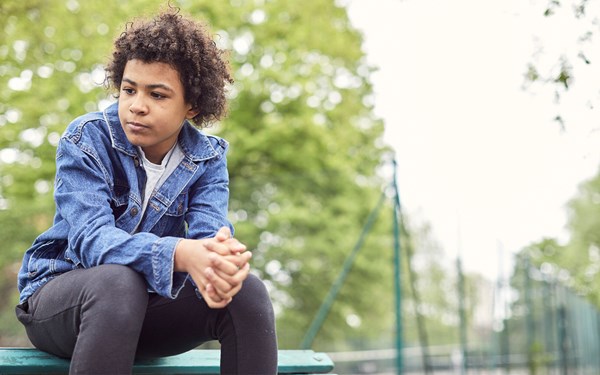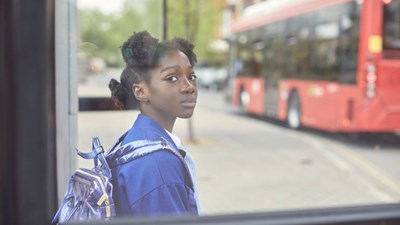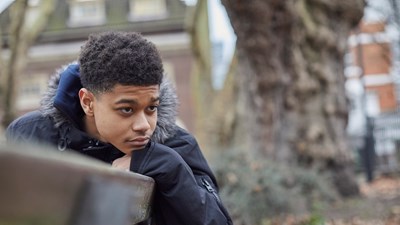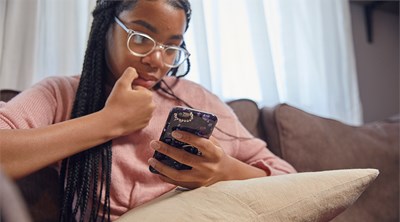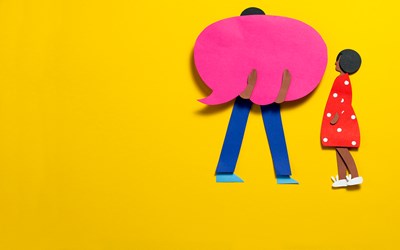On this page
Report abuse
You can contact the NSPCC Helpline by calling 0808 800 5000, emailing help@NSPCC.org.uk or completing our report abuse online form.
What is sexual abuse?
When a child or young person is sexually abused, they're forced, tricked or manipulated into sexual activities. They might not understand that what's happening is abuse or that it's wrong for the abuser to do this to them. They might be afraid to tell someone or behave as though this is normal for them to experience, both are valid for the child to be displaying. Sexual abuse can happen anywhere – and it can happen in person or online.
It's never a child's fault they were sexually abused – it's important to make sure children know this.
Types of sexual abuse
There are two types of sexual abuse – contact and non-contact abuse. And sexual abuse can happen in person or online.
Contact abuse
Contact abuse is where an abuser makes physical contact with a child or forces the child to make physical contact with someone else. This includes:
- sexual touching of any part of a child's body, whether they're clothed or not
- using a body part or object to rape or penetrate a child
- forcing a child to take part in sexual activities
- making a child undress or touch someone else.
Contact abuse can include touching, kissing and oral sex – sexual abuse isn't just penetrative.
Non-contact abuse
Non-contact abuse is where a child is abused without being touched by the abuser. This can be in person or online and includes:
- exposing or flashing
- showing pornography
- exposing a child to sexual acts
- making them masturbate
- forcing a child to make, view or share child abuse images or videos
- making, viewing or distributing child abuse images or videos
- forcing a child to take part in sexual activities or conversations online or through a smartphone.
Find out more about grooming and child sexual exploitation. Although their definitions are slightly different to sexual abuse, they are all forms of child abuse.
Signs of sexual abuse
Knowing the signs of sexual abuse can help give a voice to children and can get support for that child earlier on. Sometimes children won't understand that what's happening to them is wrong. Or they might be scared to speak out. Some of the signs you might notice include:
- Avoiding being alone with or frightened of people or a person they know.
- Language or sexual behaviour you wouldn't expect them to know.
- Having nightmares or bed-wetting.
- Alcohol or drug misuse.
- Self-harm.
- Changes in eating habits or developing an eating problem.
- Changes in their mood, feeling irritable and angry, or anything out of the ordinary.
- Change in normal behaviour for the child, for example suddenly not attending education or avoiding wanting to go home/running away.
- Bruises.
- Bleeding, discharge, pains or soreness in their genital or anal area.
- Sexually transmitted infections, including in the throat.
- Pain/soreness in throat
- Pregnancy.
- Difficulty in walking/sitting that are not usual for the child.
If a child is being or has been sexually abused online, they might:
- spend a lot more or a lot less time than usual online, texting, gaming or using social media
- seem distant, upset or angry after using the internet or texting
- be secretive about who they're talking to and what they're doing online or on their mobile phone
- behaving as though they have to be online at a certain time, or rushing to get on their phone
- have lots of new phone numbers, texts or email addresses on their mobile phone, laptop or tablet
- Expressing the need for money, this may be used if they are being blackmailed.
Children and young people might also drop hints and clues about the abuse.
If you're worried about a child and want to talk to them, we have advice on having difficult conversations. You can also visit our information and advice on online safety.
Worried about a child?
You can contact the NSPCC Helpline by calling 0808 800 5000, emailing help@NSPCC.org.uk or completing our report abuse online form.
If a child reveals abuse
If a child talks to you about sexual abuse it's important to:
- listen carefully to what they're saying
- don’t push them too much, but allow them to talk freely or answer
- let them know they've done the right thing by telling you
- tell them know it's not their fault
- say you'll take them seriously
- don't confront the alleged abuser
- explain what you'll do next
- report what the child has told you as soon as possible
- decide if they need medical attention.
Report abuse
You can contact the NSPCC Helpline by calling 0808 800 5000, emailing help@NSPCC.org.uk or completing our report abuse online form.
Effects of sexual abuse
Sexual abuse can have both short and long-term effects. The impact of sexual abuse can last a lifetime. Children, young people and adults may live with:
- anxiety and depression
- eating disorders
- post-traumatic stress
- difficulty coping with stress
- self-harm
- suicidal thoughts and suicide
- flashbacks or nightmares
- sexually transmitted infections
- pregnancy
- feelings of shame, guilt and isolation
- drug and alcohol problems
- relationship problems with family, friends and partners.
Our services can support children and young people who have experienced sexual abuse to help support them and to make sure they receive the care they need.
Who's at risk
Any child is at risk of being sexual abused. It's important to remember that both boys and girls can be sexually abused.
Most children who've been sexual abused are abused by someone they know. This could be a family member, a friend or someone who has targeted them, like a teacher or sports coach.
Children who are sexually abused online could be abused by someone they know. They could also be abused by someone who commits a one-off sexually abusive act or a stranger who builds a relationship with them.
Some children are more at risk of sexual abuse. Children with disabilities are more likely to be sexually abused, especially those who are unable to tell someone what's happening or don't understand what's happening to them is abuse.
Some abusers target children who may be isolated. For example, a child may be in care or they may already be neglected by their parents or carers. Other abusers target families or children who have no obvious vulnerabilities.
It's important to remember that a child is innocent and the abuser is at fault.
Report sexual abuse
To report sexual abuse:
- contact the children's social care team at their local council.
- call 999 if the child is at immediate risk or call 101 if you think a crime has been committed
- call Crimestoppers anonymously on 0800 555 111 or online
- call our Helpline on 0808 800 5000 - our dedicated child protection specialists will be able to advise and take any necessary action.
Report Abuse in Education helpline
We’ve launched a dedicated helpline for children and young people who have experienced abuse at school, and for worried adults and professionals that need support and guidance, including for non-recent abuse. Call our new NSPCC helpine, Report Abuse in Education on 0800 136 663 or email help@nspcc.org.uk.
Support
For parents
Finding out your child has been sexually abused can be frightening and distressing. But there's help for you and your family.
We Stand supports non-abusing parents and carers whose children have been sexually abused.
Worried about a child?
You can contact the NSPCC Helpline by calling 0808 800 5000, emailing help@NSPCC.org.uk or completing our report abuse online form.
For children and young people
We run therapeutic services for children who have experienced, or are at risk of, sexual abuse and their families:
The Lighthouse provides support to children and young people who have experienced sexual abuse to help them recover.
Our Women as Protectors service helps mums and carers who are in contact with a man who may cause sexual harm to their children.
The Survivors Trust provide emotional support and information to any survivor of child abuse.
Find out more about all our services for children, including how to get in touch with ones in your area.
How Childline can help
We understand how difficult it is for children to talk about sexual abuse. Whether it's happening now or happened in the past, Childline can be contacted 24/7. Calls to 0800 1111 are free and confidential. Children can also contact Childline online.
Childline has information and advice for children and young people about sexual abuse and rape and sexual assault.
Prevent sexual abuse
We can all help prevent sexual abuse and keep children safe. We can help stop sexual abuse before it happens. If a child has been sexually abused, we can help give them a voice so they can tell someone.
Teaching children and young people about healthy relationships and how to stay safe online can help prevent sexual abuse and exploitation. These foundations can be laid from a young age. Our PANTS rules are a simple way to teach younger children how to stay safe from abuse. Your child may have already had the talks in school, but it’s important to talk to them at home too. We have tips and advice on how to have difficult conversations.
It's also important to make sure children and young people know there are trusted adults, including outside home that they can speak to about their worries, such as school or Childline.
You can ask your child's school to book a free Speak out Stay safe assembly for primary school children. Our specially trained staff and volunteers hold assemblies and workshops, covering topics like bullying and abuse, but without using any scary words or adult language.
If you're worried about gangs, it can be difficult to know what to do to help protect young people. Whether a child is thinking about joining a gang, is already involved or want to leave, they need help and support. You can contact our Helpline for details of organisations near you that can give you support and advice.
Encourage transparency in what your children are doing online. You can keep gaming devices and computers and laptops with webcams in the living room or family spaces. Use parental controls and keep up-to-date on the apps and games children and young people are using.
We know parents and carers of d/Deaf and disabled children and young people can worry about keeping their children safe from abuse. Some children and young people may not be aware of the dangers of abuse. Or aren't able to let someone know they're not safe because it may be harder for them to show or tell someone.
We have a range of guides you can download to help children learn the PANTS rules without using any scary words. You can look at these together and talk about what PANTS means. We've also got tips and advice to help you answer some of the common questions children and young people ask.
For d/Deaf children and young people we have a video in British Sign Language (BSL) with subtitles to help you share the PANTS rules. Our video on contacting Childline using SignVideo is a useful tool to help you explain different types of abuse and give children and young people the knowledge of who they can contact if they're worried.
Talk PANTS with your kids with our fun activity pack
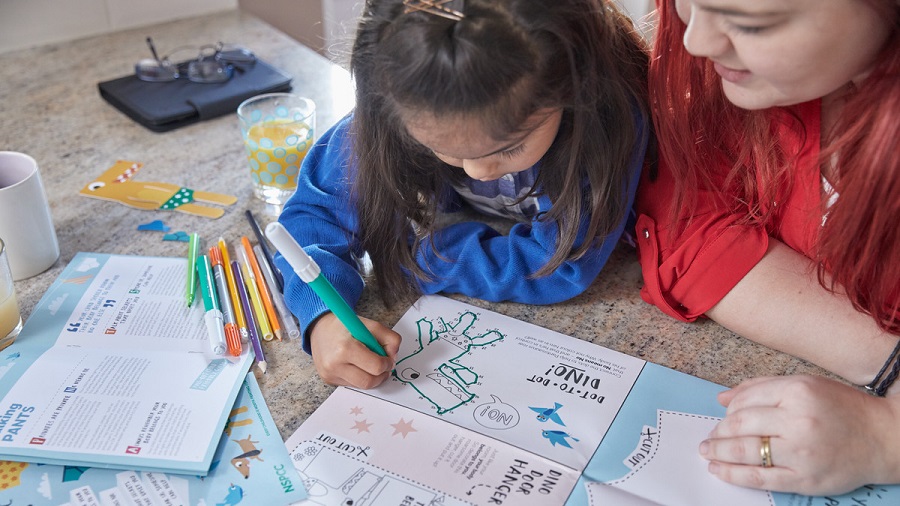
No one ever wants to think about their child being affected by sexual abuse, but that's exactly why talking about it is so important.
That's why we've created a Talk PANTS pack to help families across the country start the conversation. For just £5 you can get your pack - and your money will go to helping us in our important work keeping children safe around the UK.
If your child has sexually abused someone
We know that sometimes children are abused by other young people. When this happens it's harmful to both themselves and others. Children who develop behaviour which harms others have often experienced abuse and neglect themselves. Sometimes children who have been sexually abused might not know what has happened to them is wrong – which makes them feel their sexual behaviour towards others is okay.
If your child has sexually abused or harmed another child, or you're worried about their behaviour, it's important to get them the support they need. We run therapeutic services for children who are at risk of harming other children sexually:
- National Clinical Assessment and Treatment Service (NCATS).
- Turn the Page.
Find out more about all our services for children, including how to get in touch with ones in your area.
Help if you're worried about your behaviour towards children
If you're worried about your behaviour, help is available. Contact our Helpline by calling 0808 800 5000 or emailing help@NSPCC.org.uk.
If you are, or think you might, sexually abuse a child or young person, there's help available. Stop it now! is a free helpline offering information, guidance and support.
- Call Stop it now! – People living in the UK and Ireland can call for free on 0808 1000 900 (Monday – Thursday 9am-9pm and Friday 9am-5pm).
- Message online – Stop it now! have a secure messaging service available24-hours a day.
How The Lighthouse helps
Getting the right support when a child has been abused is so important. But after sexual abuse, children and their families often struggle to navigate health and social care, therapeutic services, police, and often, the criminal justice process by themselves.
That’s why we’re proud to have helped launch The Lighthouse, the UK's first Child House. It's the first centre in the UK to bring multiple agencies together under one roof to provide a child-friendly, multidisciplinary service for victims and survivors of child sexual abuse and exploitation. Based in Camden, it serves the London boroughs of Barnet, Camden, Enfield, Haringey and Islington.
The Lighthouse is delivered by University College London Hospital NHS Foundation Trust (UCLH) in partnership with the NSPCC and the Metropolitan Police. As part of The Lighthouse’s therapeutic services, the NSPCC offers our Letting the Future In intervention.
"The Lighthouse has been a little bit of refuge."
Parent in London
When a child has experienced sexual abuse, they and their family are often left to navigate finding the right support for their child alone. From health care professionals, social workers, therapists and the police – this frequently means the child has to re-tell and re-live their experience with each agency or professional, risking being re-traumatised by the process.
The Lighthouse is based on the international Child House (Barnahus) model, established in Reykjavik in 1998. This model is child-centred, allowing medical and sexual health professionals, counsellors, therapists, and the police to work together under one roof – guiding children, young people and their families through their journey of recovery, helping them access the support they need at every step, including the court process.
"I only have to tell the story once."
Child using The Lighthouse in London
In London, where The Lighthouse is based, research has identified a “significant unmet need” for emotional and health support for children who have experienced sexual abuse1. Those who do sometimes have to wait months to receive therapy and the support they need. One study found that 8 in 10 adolescents who experienced sexual abuse had mental health problems 4-5 months after the assault2. That is why it is so important children get the help they need when they need it.
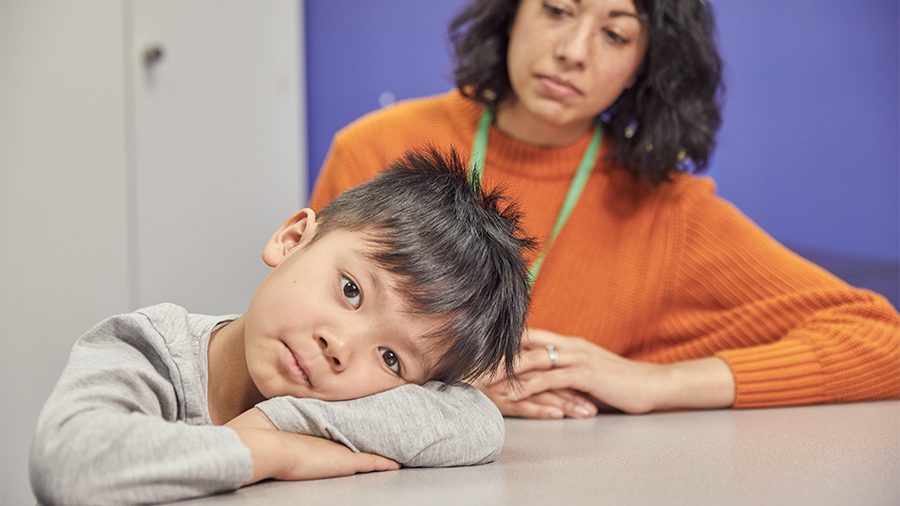
In 2019/20, The Lighthouse received 321 referrals, meaning approximately 1 in 2 children in North Central London who reported sexual offences were referred there for support.3 The Lighthouse team were able to accept 258 of those referrals, supporting children and families through this difficult time.
The team regularly ask children and their parents what they like about the service centre. Children felt that at The Lighthouse:
- their views were taken seriously
- they were listened to
- the practitioners were easy to talk to
- The Lighthouse teams were working together to support them.
"I like the way I can talk and be advised and listened to. I can also talk about what I’d like to talk about."
Child using The Lighthouse in London
The majority of parents and guardians that fedback to us felt the services they received were good, and felt supported by The Lighthouse.
"I don’t know how my family would have got through this trauma without this service. Truly amazing."
Parent in London
The Mayor of London’s Office for Policing and Crime is evaluating the Lighthouse and has published 3 reports to date, with a final report due in Summer 2021.
- The Lighthouse: London's Child House - Initial Evaluation Report
- The Lighthouse: 9-month interim evaluation report
- The Lighthouse: 2-year interim evaluation report
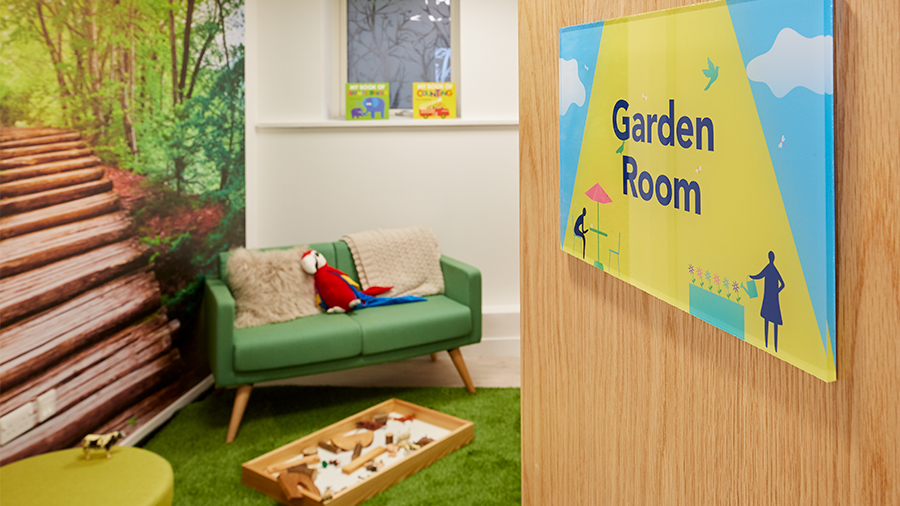
We believe every child should have the support they need after facing sexual abuse. Being a partner in The Lighthouse has shown us the difference a Child House can make for young people who've experienced abuse and we're pleased that funding for The Lighthouse in London has been extended to March 2022.
"Think it’s a great service dedicated to young people and their families. Should have more around the UK"
Parent in London
Given the success of The Lighthouse in London, we’ll advocate nationally for the benefits of this model and campaign to have new sites funded and built across the UK.
With support from government and commissioners, we can make the Child Houses model an integral part of the support and services available to children who’ve experienced abuse.
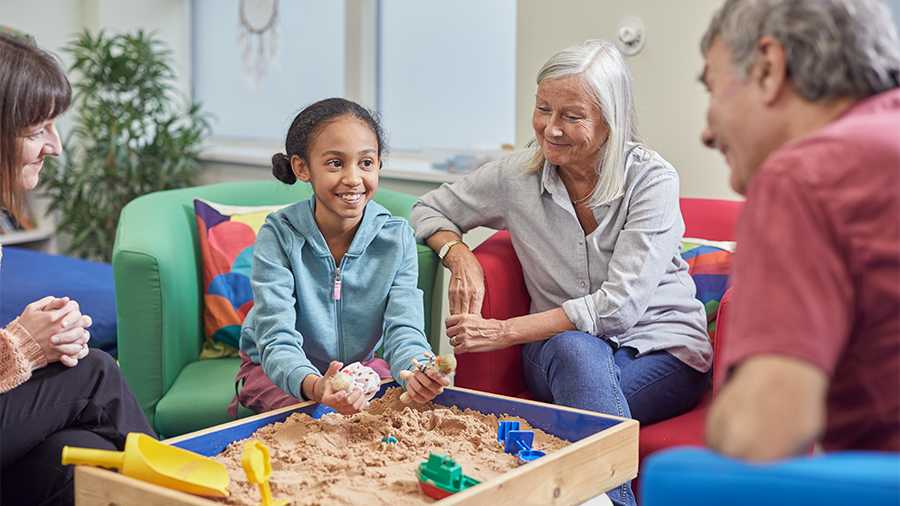
Thanks to the Home Office, The Mayor of London’s Office for Policing and Crime, NHS England, the Department for Education, charity partner Morgan Stanley (who raised over £1.5m) this multi-agency project was brought to life. The generous funding the project received helped to refurbish and transform the NSPCC’s service centre in North London.
£25 could pay for toys for children to use during therapeutic sessions to help explain how they’re feeling. Around 90% of our income is donated - we can only be here with your help.4
More support for you and your child
References
-
1. Goddard, A., Harewood, E. and Brennan, L., (2015) Review of pathway following sexual assault for children and young people in London. NHS England, The Havens, Kings College Hospital London.
-
2. (Khadr, S. et al. (2018). Mental and sexual health outcomes following sexual assault in adolescents: a prospective cohort study. The Lancet Child & Adolescent Health, 2(9), 654-665.) Baseline interviews (T0) were done less than 6 weeks after an assault to collect data on sociodemographic and assault. At T0, psychological symptom scores showed that 115 (88%) of 130 females were at risk for depressive disorder, 90 (71%) of 126 were at risk for anxiety disorders, and 116 (91%) of 128 were at risk for post-traumatic stress disorder, with symptoms largely persisting at T1. 68 (80%) of 85 females who had a diagnostic assessment at T1 had a psychiatric disorder, with multiple disorders in 47 (55%) of 85.
-
3. Harewood, E. (2021) The Lighthouse annual report 2019-2020. London: The Lighthouse https://www.thelighthouse-london.org.uk/wp-content/uploads/2021/04/Lighthouse-Annual-Report-2020-web-version.pdf The data analysed includes Excelicare records of children and young people aged 0–25 years old referred to the Lighthouse following disclosure or suspicion of child sexual abuse. The data relates to all 321 referrals and 198 initial assessments and onward support of children and young people living in the North Central London area who accessed the service between October 2019 and September 2020. Compared with the number of police reports for sexual offences in under 18 years olds, it can be seen that the number of Lighthouse referral rate ranges from 34 to 59% of the total number of sexual offences reported to the police in the borough in the same period (Oct 2019 – Sept 2020). This means the Lighthouse continues to receive referrals for approximately 1 in 2 children and young people in NCL who report sexual offences. 258 (80%) of referrals to the Lighthouse were accepted, allocated to a team and offered either an an initial assessment, consultation or an ABE
-
4. In 2019/20 our total income was £117.6 million. Of this total £93.5 million came from donations and legacies and a further £9.0 million came from activities undertaken for the purpose of raising funds (like dinners and balls, auctions and challenge events). This gives a total of £102.5 million from our supporters, or 87% of all income.


